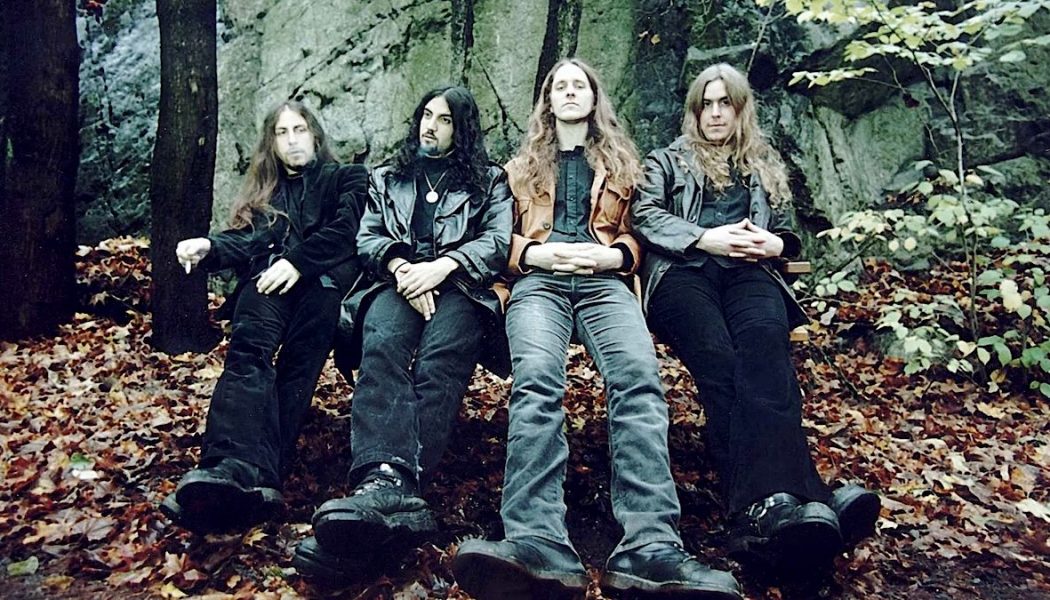
Despite being an exceptional concept album, Opeth’s fourth album, 1999’s Still Life, failed to garner enough industry attention to fully reward the amount of hard work and hope they’d been put into it. Even so, their recent signing with Peaceville Records and increased touring opportunities meant that mastermind Mikael Åkerfeldt and company still felt hopeful that their big break was just over the horizon. Luckily, that turned out to be true, as 2001’s Blackwater Park was not just a major steppingstone for the Swedish troupe, but also a huge leap forward for extreme metal as a whole.
Part of the reason for why was that Opeth was forced to leave Peaceville and move to Music for Nations / Koch, resulting in an expansion of distribution and promotional prospects. At first, Åkerfeldt was unhappy with the obligatory move; however, he soon realized that it was for the best, as Music for Nations had the professional demeanor, abundant staff, and logistical prowess to stay true to their promises. Among other things, this newfound partnership also allowed Opeth to bring on a new producer — Porcupine Tree’s Steven Wilson — whom Åkerfeldt and guitarist Peter Lindgren greatly admired.
Although Wilson had emailed Åkerfeldt to tell him that the stylistic dexterity of Still Life basically reinvigorated his love for metal, Åkerfeldt was intimidated by Wilson’s fame and perceived eruditeness. Thankfully, the pair hit it off after meeting at a taco bar in Camden, London, and Wilson agreed to work on Blackwater Park. In Book of Opeth, Wilson admitted, “Initially, I was concerned by the prospect of producing a metal band, not knowing what I could do and not knowing much about metal.”
The added pressure of satisfying Opeth’s growing fan base amidst developing the band’s need for stylistic adventurousness was also a factor. Fortunately, Wilson was the perfect person to bring Åkerfeldt’s dreams to life, with his dual roles as expert producer and unexpected but invaluable performer making Blackwater Park an incredibly refined, focused, and timeless part of progressive death metal history. (Naturally, his work here, as well as on follow-ups Deliverance and Damnation, also led Porcupine Tree down a heavier path for 2002’s In Absentia, 2005’s Deadwing, and so on.)
In the Making of Blackwater Park documentary, bassist Martin Méndez and former drummer Martin López discuss how they felt more capable and involved than ever, too. Even though Åkerfeldt was clearly the head of Opeth by this point, he nonetheless encouraged and worked with López and Méndez as much as possible. As a result, the rhythmic duo still felt like their voices mattered as they learned to play with more “finesse” and “confidence.”
As for the creation of Blackwater Park, Opeth returned to Studio Fredman in Gothenburg, Sweden (where they’d done Still Life and predecessor My Arms, Your Hearse) and worked on it between August and October 2000. Whereas Åkerfeldt never saw the LP as a drastic evolution musically (which is debatable, of course), the lyrical content is another story, as it’s considerably autobiographical and misanthropic. In the documentary, he comments, “I think [there are] so many crazy people out there, and I get harassed by idiots. All this made me write lyrics about how I despise other people. Then I spiced it up to make it more sick!”
Blackwater Park was released in Europe on March 12th, 2001, and day later in North America. With the aid of new manager Andy Farrow, it was significantly successful. For one thing, it was the start of them having promotional singles (“The Drapery Falls” and then a wonderful non-album cut, “Still Day Beneath the Sun,” which would eventually appear on a re-release of Blackwater Park). Plus, it saw Opeth embarking on their biggest tour thus far, playing alongside heavy hitters like Nevermore, Amorphis, and Katatonia across the world for many weeks at a time. Lastly, press reviews were uniformly positive, with even non-metal outlets like The Village Voice, AllMusic, and Exclaim! singing its praises. In the years since, the album has justifiably been cited as both Opeth’s finest achievement and one of the genre’s greatest albums ever.
Over the years, the group has continued to develop their sound and take listeners to new (and, more recently, polarizing) places; yet, the record remains immensely special for its pristine and adventurous production, spacious instrumentation, distinguished songwriting, and generally flawless hybrid of brutality and beauty. For instance, opener “The Leper Affinity” juxtaposes torrents of polished vehemence with bittersweet folk-rock asides and a soberingly mournful closing piano motif (courtesy of Wilson). Afterward, “Bleak” is a comparatively commercial ballad in which Åkerfeldt and Wilson exchange captivating lead melodies amidst nightmarish fury and jazzily soothing respites.
From there, “Harvest” develops the warmly somber acoustic ode excellence of Still Life’s “Benighted” before “The Drapery Falls” justifies its place as perhaps Opeth’s biggest song with its perfect marriage of light and dark bravura. Next, “Dirge for November” lends a slightly more off-kilter approach to the same sort of amalgamation, whereas “The Funeral Portrait” presents a consistently eviler persona that predicts the almost relentless harshness of Deliverance. Likewise, the penultimate “Pattern in the Ivy” — a brief instrumental comprised of piano chords and acoustic arpeggios — comes across like a more cultured sibling of Orchid’s “Requiem” and Deliverance’s “For Absent Friends.” Finally, closer “Blackwater Park” is like the hyperactive culmination of its predecessors, shuffling through many of their best elements as it sets-up the chaos to come on its 2002 successor.
In many ways, Blackwater Park was life-changing for the quartet and game-changing for progressive death metal. While it may not be Opeth’s unarguable masterpiece — they’ve become so wide-ranging that it’s hard to choose just one LP as their most enjoyable or representative opus — it was the one that, in several ways, finally took them where they needed to be. Years later, it’s just as remarkably efficient, bold, multifaceted, and poised; as such, it’s fair to say that no other progressive death metal record that came out afterward — by Opeth or not — has definitively topped it.










